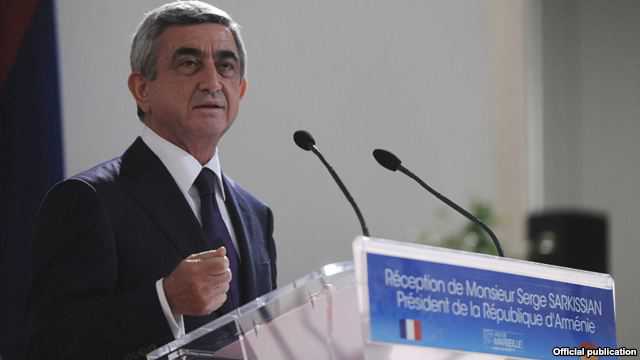President Serzh Sarkisian has urged Turkey to “repent” for the World War One-era massacres of Armenians in the Ottoman Empire and expressed confidence that Ankara will eventually recognize them as genocide.

“We believe that Turkey must repent,” he said during a visit to France’s second largest city of Marseille late on Wednesday. “That is neither a precondition nor a desire to exact revenge. Turkey must come face to face with its history.”
“One day Turkey’s leadership will find the strength to reassess its approaches to the Armenian Genocide,” Sarkisian said, speaking at an official reception organized in his honor by Marseille’s Mayor Jean-Claude Gaudin and attended by prominent members of the local Armenian community.
“Sooner or later Turkey, which considers itself a European country, will have a truly European leadership that will bow its head at the Tsitsernakabert [genocide memorial in Yerevan,]” claimed the Armenian leader. “The sooner the better, but that is up to the Turkish people.”
There was no immediate reaction to the remarks from Ankara which vehemently denies that some 1.5 million Armenians were massacred by the Ottoman Turks in 1915-1918.
France – President Serzh Sarkisian speaks at an official reception in Marseille, 7Dec2011.
Successive Turkish governments have said that Armenians died in much smaller numbers and as a result of civil strife, rather than a premeditated government effort to exterminate a key Christian minority in the crumbling Ottoman Empire.
Turkish leaders reacted angrily after French President Nicolas Sarkozy urged them to stop denying the genocide during an October visit to Armenia. “Collective denial is even worse than individual denial,” Sarkozy said after laying flowers at the Tsitsernakabert memorial. He also implicitly threatened to enact a law that would make Armenian genocide denial a crime in France.
Turkish Prime Minister Recep Tayyip accused Sarkozy of playing the anti-Turkish card to secure reelection next year and warned of serious damage to relations between France and Turkey.
By contrast, Sarkisian was full of praise for the French leader. “We must simply be grateful to the wise president of this beautiful country,” he told the mostly French-Armenian audience.
In his speech, Sarkisian did not mention the future of the Turkish-Armenian normalization agreements signed two years ago. Earlier this year, he threatened to withdraw Yerevan’s signature from the agreements if Ankara continues to make their parliamentary ratification contingent on the resolution of the Nagorno-Karabakh conflict.
via Sarkisian Urges Turkey To ‘Repent’.





